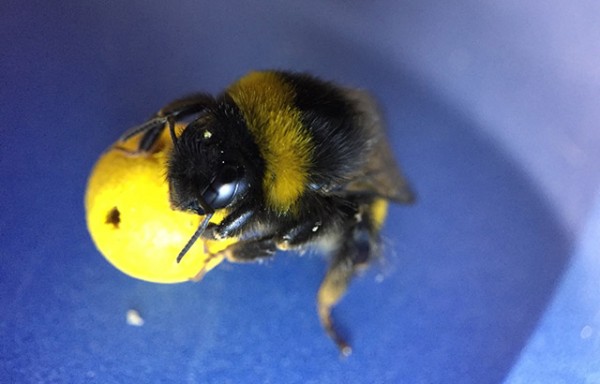By Ana Verayo, | February 24, 2017

In this new study, bees show how they are also good problem solvers. (Iida Loukola/Queen Mary University of London)
In an astonishing discovery, bumblebees can apparently learn a task quickly just by watching other bees carry out the task. In this new study, researchers were able to observe and study bees' interaction with each other, revealing this remarkable trait and highly complex brain cognition.
Like Us on Facebook
Past studies have revealed that these intelligent critters can learn how to pull strings and push caps and even rotate a lever to gain access to food. However, in this new study, bees show how they are also good problem solvers.
According to the first author of the study, Olli Loukola of the Queen Mary University of London, past research has shown that bumblebees can complete complex tasks. However, these tasks were similar to their natural behavior, like when they extract nectar from a flower. In this new study, bees are tested with an unnatural activity like moving balls.
The first part of the experiment involved bees on a platform moving a yellow ball to a target area with hidden sucrose as food. A fake replica of a bee attached on a stick showed the bees repeatedly how to maneuver that ball to the target area to obtain the sweet prize.
Results revealed that 10 bees which did not see the demonstration almost never completed this task. The nine bees that were shown this successfully completed this task. Upon more test trials, these bees learned faster and took shorter times and quicker pathways.
The second experiment involved a platform with three balls placed at different distances from the center. A trained bee moves the farthest ball towards the center, and the other two scenarios involved a magnet moving the ball to the center and no training at all. Researchers tested the bees whether they can move one of the three balls towards the center to receive a sweet, sugary prize.
The results revealed that bees can successfully complete a complex task 99 percent of the time when they are trained by other bees as opposed to the magnet or no training at all. With a magnet, bees could complete this task 78 percent of the time, and without any training, they yield a 34 percent success rate.
Loukola explained that this does not only simply mean that bees just copy this task upon repetitive demonstration. Since the bees saw this task executed in different ways, they were able to choose to best strategy, and this suggests a highly impressive amount of cognitive flexibility.
This new study was published in the journal Science.
-
Use of Coronavirus Pandemic Drones Raises Privacy Concerns: Drones Spread Fear, Local Officials Say

-
Coronavirus Hampers The Delivery Of Lockheed Martin F-35 Stealth Fighters For 2020

-
Instagram Speeds Up Plans to Add Account Memorialization Feature Due to COVID-19 Deaths

-
NASA: Perseverance Plans to Bring 'Mars Rock' to Earth in 2031

-
600 Dead And 3,000 In The Hospital as Iranians Believed Drinking High-Concentrations of Alcohol Can Cure The Coronavirus

-
600 Dead And 3,000 In The Hospital as Iranians Believed Drinking High-Concentrations of Alcohol Can Cure The Coronavirus

-
COVID-19: Doctors, Nurses Use Virtual Reality to Learn New Skills in Treating Coronavirus Patients







